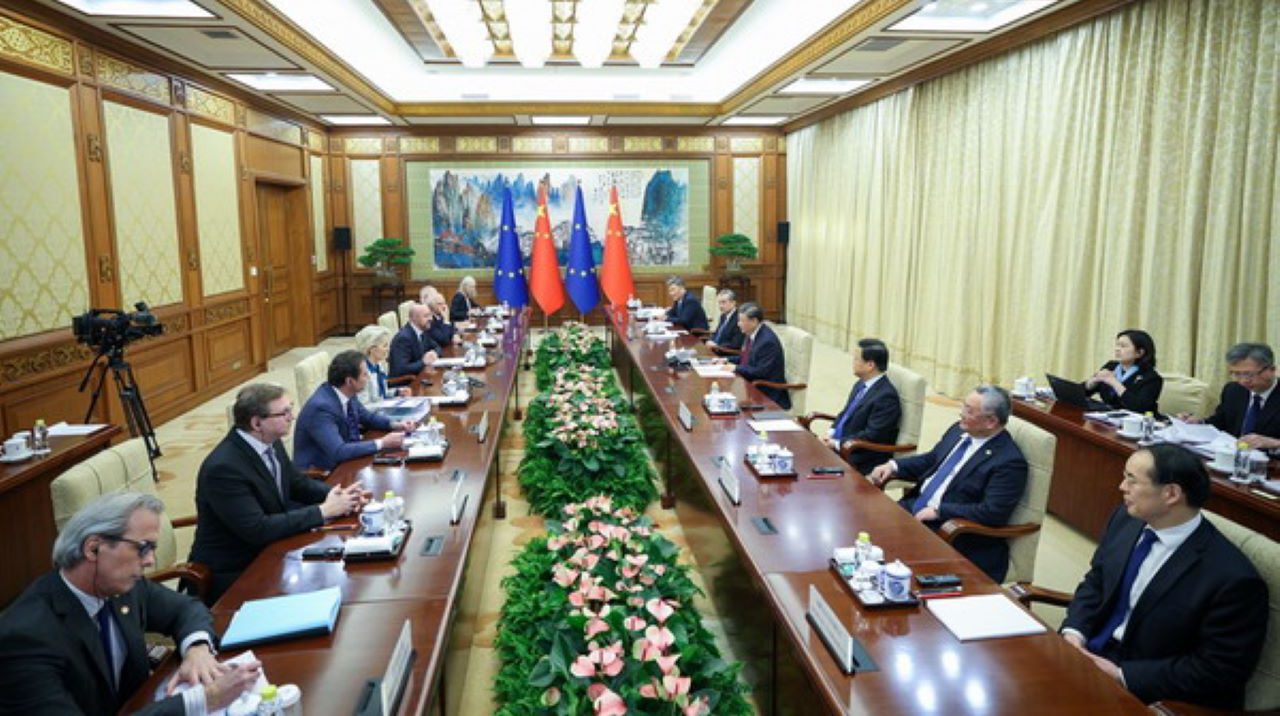EU: 24th EU-China Summit: engaging to promote our values and defend our interests
Beijing, 7 December 2023
China: Xi urges enhanced political mutual trust, dialogue, cooperation with EU
On December 7, President Xi Jinping met with President of the European Council Charles Michel and President of the European Commission Ursula von der Leyen who were in China for the 24th China-EU Summit at the Diaoyutai State Guesthouse.
President Xi noted that since the end of last year, the China-EU relationship has shown a good momentum of consolidation and growth, and the China-EU high-level dialogues in the strategic, economic and trade, green, and digital fields have produced rich outcomes. This serves the interests of both sides and meets the expectations of our peoples. China and the EU are two major forces advancing multipolarity, two major markets in support of globalization, and two major civilizations championing diversity. Amid the increasingly turbulent international situation, the China-EU relationship has strategic significance and implications for global peace, stability and prosperity. It is incumbent on both sides to provide greater stability for the world and stronger impetus for development.
President Xi stressed that this year marks the 20th anniversary of the China-EU comprehensive strategic partnership. The two sides need to take stock of history, navigate the trend of the world, and uphold the apt description of our relationship as a comprehensive strategic partnership. The two sides need to consolidate the political foundation, view each other from a strategic perspective, fully leverage the guiding role of the China-EU Summit and the five high-level dialogues, strengthen strategic communication, and increase understanding and properly handle differences through constructive dialogue. The two sides need to develop a right perception of each other, promote mutual understanding and trust, honor commitments, do the right thing and be wholehearted in developing China-EU relations. We should not view each other as rivals just because our systems are different, reduce cooperation because competition exists, or engage in confrontation because there are disagreements.
There is a high degree of complementarity between the Chinese and EU economies. The two sides should do more to increase the breadth and depth of cooperation and tighten the bond of shared interests. The Chinese economy enjoys a good momentum of steady growth. As China pursues high-quality development and high-standard opening up, it sees the EU as a key partner for economic and trade cooperation, a preferred partner for scientific and technological cooperation, and a trustworthy partner for industrial and supply chain cooperation. China is ready to work with the EU for mutual benefit and common development. The two sides should leverage their complementary strengths in terms of market, capital and technology to upgrade traditional industries and foster emerging ones, explore new modes of cooperation, foster new areas of growth, and jointly improve industrial and supply chains. The two sides should also bolster people-to-people exchanges and facilitate personnel interflows.
President Xi underscored that Chinese modernization and European integration are strategic choices that China and Europe have made respectively with the future in mind. The two sides should respect and support each other, and leverage the complementarity of their development strategies for common progress. The Belt and Road Initiative (BRI) is an inclusive platform that has brought real benefits to over 150 countries and their peoples. As the saying goes, when you give roses to others, the fragrance lingers on your hand. China will continue to promote high-quality Belt and Road cooperation, including by creating synergy between the BRI with the EU’s Global Gateway to help developing countries grow faster.
The two sides should strengthen communication and coordination in multilateral fora including the U.N. and the G20, uphold multilateralism, oppose camp-based confrontation, and promote the political settlement of international and regional hotspots. The two sides should conduct dialogue and cooperation on artificial intelligence (AI) and other major issues concerning the future of humanity to contribute to the well-being of humanity and rise to global challenges.
President Michel and President von der Leyen noted that the EU and China are two major forces of the world and important trading partners for each other. The areas of EU-China cooperation continue to expand. Such cooperation is based on mutual benefit and equality. Managing and growing EU-China relations has a direct bearing on the interests of the people of both sides, and also concerns global prosperity and security. The EU highly values its ties with China, and does not want to decouple from China. It seeks a long-term, stable, predictable and sustainable relationship with China, and hopes that the EU-China Summit will help reenergize EU-China relations.
The EU side acknowledged its satisfaction with the outcomes of the EU-China high-level dialogues this year, and sees the long-term, steady growth of the Chinese economy as in the interest of Europe. It hopes that the two sides will continue to strengthen dialogue and cooperation in the economic and trade, green, and digital fields, work together to keep supply and industrial chains stable and secure, and strengthen dialogue and cooperation on major global issues concerning the future of humanity, such as climate change and AI.
The EU maintains its one-China policy. It is prepared to increase communication and understanding with China in a mutually respectful, open and candid spirit on issues where they disagree. The EU and China have shared responsibilities and interests in keeping the world peaceful and stable. The EU would like to have close communication and coordination with China, uphold multilateralism and the purposes and principles of the U.N. Charter, and work for the settlement of regional hotspots including Ukraine and the Middle East.
Wang Yi was present at the meeting.
Source: Foreign Ministry of China

